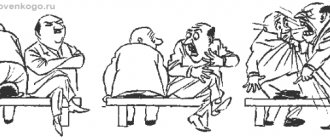The results on the extraversion and neuroticism scales are presented using a coordinate system. The interpretation of the results obtained is carried out on the basis of the psychological characteristics of the individual corresponding to one or another square of the coordinate model, taking into account the degree of expression of individual psychological properties and the degree of reliability of the data obtained.
Drawing on data from the physiology of higher nervous activity, Eysenck hypothesizes that strong and weak types, according to Pavlov, are very close to extroverted and introverted personality types. The nature of introversion and extraversion is seen in the innate properties of the central nervous system, which ensure the balance of the processes of excitation and inhibition.
Thus, using survey data on the scales of extraversion, introversion and neuroticism, it is possible to derive indicators of personality temperament according to the classification of Pavlov, who described four classical types: sanguine (according to the basic properties of the central nervous system is characterized as strong, balanced, mobile), choleric (strong, unbalanced, mobile), phlegmatic (strong, balanced, inert), melancholic (weak, unbalanced, inert).
“pure” sanguine person quickly adapts to new conditions, quickly gets along with people, and is sociable. Feelings arise and change easily, emotional experiences are usually shallow. Facial expressions are rich, mobile, expressive. He is somewhat restless, needs new impressions, does not sufficiently regulate his impulses, and does not know how to strictly adhere to the established routine, life, or work system. In this regard, he cannot successfully carry out work that requires an equal expenditure of effort, prolonged and methodical tension, perseverance, stability of attention, and patience. In the absence of serious goals, deep thoughts, and creative activity, superficiality and inconstancy are developed.
Choleric is characterized by increased excitability, actions are intermittent. He is characterized by sharpness and swiftness of movements, strength, impulsiveness, and vivid expression of emotional experiences. Due to imbalance, carried away by a task, he tends to act with all his might and become more exhausted than he should. Having public interests, his temperament shows initiative, energy, and integrity. In the absence of spiritual life, choleric temperament often manifests itself in irritability, efficiency, lack of restraint, hot temper, and inability to self-control under emotional circumstances.
A phlegmatic person is characterized by a relatively low level of behavioral activity, new forms of which are developed slowly, but are persistent. Possesses slowness and calmness in actions, facial expressions and speech, evenness, constancy, depth of feelings and moods. A persistent and persistent “worker of life”, he rarely loses his temper, is not prone to emotions, having calculated his strength, gets things done to the end, is even in relationships, moderately sociable, and does not like to chat in vain. Saves energy and doesn’t waste it. Depending on the conditions, in some cases a phlegmatic person may be characterized by “positive” traits - endurance, depth of thoughts, constancy, thoroughness, etc., in others - lethargy, indifference to the environment, laziness and lack of will, poverty and weakness of emotions, a tendency to perform just habitual actions.
Melancholic . His reaction often does not correspond to the strength of the stimulus; there is depth and stability of feelings with weak expression. It is difficult for him to concentrate on something for a long time. Strong influences often cause a prolonged inhibitory reaction in a melancholic person (give up). He is characterized by restraint and subdued motor skills and speech, shyness, timidity, and indecisiveness. Under normal conditions, a melancholic person is a deep, meaningful person who can be a good worker and successfully cope with life’s tasks. Under unfavorable conditions, he can turn into a closed, fearful, anxious, vulnerable person, prone to difficult internal experiences of life circumstances that do not deserve it at all.
Self-esteem test
The final test authored by Professor Eysenck “Self-assessment of mental states.” This technique is intended for self-assessment of the personal state of the psyche on four scales: Rigidity, Aggression, Frustration, Anxiety. (see table for full description).
The test will ask you questions describing various mental states. Depending on how much this condition is inherent in you, select the answer: “Often”, “Rarely”, “Never”.
After passing the test, you will receive the sum of points on all 4 scales + the corresponding transcript.
Good luck with your testing and good results!
What does the resulting index mean?
If you passed only one test, write down the number of points you received and the corresponding IQ level that the program gave you and find its value in the table.
| IQ level | % of people | Description |
| less than 20 | 0,20% | People with severe forms of mental retardation. As a rule, they are practically untrainable, cannot take care of themselves and are under constant care. |
| from 21 to 50 | 2% | These are people with a moderate form of dementia. They are unable to learn, but can take care of themselves quite successfully. |
| from 51 to 70 | 7% | Mild form of mental retardation. They can study in special institutions and can successfully take care of themselves. |
| from 71 to 80 | 10% | People with mild mental retardation. Most often, they do not study in special institutions, but graduate from regular schools, albeit with low grades. |
| from 81 to 90 | 10% | Intelligence is below average. These people most often study normally in secondary educational institutions, however, they rarely receive higher education and work in areas related to manual labor. |
| from 91 to 100 | 25% | Average IQ. Such people successfully graduate from school, enter universities, work in average positions not related to science, mathematics, etc. |
| from 101 to 110 | 25% | Average IQ. Such people can graduate from any university and achieve certain heights in science and business in middle management positions. |
| from 111 to 120 | 12% | Above average intelligence. Such people study throughout their lives and, depending on their hard work, can achieve significant heights. |
| from 121 to 130 | 6% | High intelligence. These are people with good mental abilities, as a rule, excellent students at school and college. |
| from 131 to 140 | 3% | Very high intelligence. Extraordinary individuals capable of achieving excellent success in business and science. Outstanding scientists, artists, etc. |
| above 140 | 0,20% | These people are usually called geniuses. They are extremely extraordinary and outstanding personalities; examples include Bill Gates and Steve Hawking. |
Interpretation of results
MPI
Extraversion:
- from 32 to 48 - “pure” extrovert
- from 16 to 32 - ambivalence, uncertainty
- from 0 to 16 - “pure” introvert
Neuroticism:
- from 32 to 48 - pronounced neuroticism
- from 16 to 32 - average score
- from 0 to 16 - emotional stability
Lie:
- more than 20 - absolute unreliability of the results
- from 16 to 20 - a dubious result
- from 5 to 15 points - reliable result
- 4 points or less - questionable result
EPI
Extraversion:
- over 19 - bright extrovert,
- over 15 - extrovert
- 12 - average value,
- less than 9 - introvert,
- less than 5 - deep introvert.
Neuroticism:
- more than 19 – very high level of neuroticism,
- more than 14 – high level of neuroticism,
- 9 - 13 - average value,
- less than 7 – low level of neuroticism.
Lie:
- more than 4 - insincerity in answers, which also indicates some demonstrative behavior and the subject’s focus on social approval,
- less than 4 is normal.
EPQ
Extraversion:
- more than 15 - “pure” extrovert
- from 7 to 15 - ambivalence, uncertainty
- from 0 to 6 - “pure” introvert
Neuroticism:
- more than 16 - pronounced neuroticism
- from 8 to 16 - average score
- from 0 to 7 - emotional stability
Psychoticism:
- more than 10 - working with people is contraindicated
- from 6 to 10 - there is a tendency towards emotional inadequacy
- from 0 to 5 - absent
Lie:
more than 10 - unreliable result
What is temperament?
Temperament is one of the most important innate characteristics of every person. It is he who determines the level of activity, energy, rhythm of life and emotionality, thanks to which a person forms his daily routine, chooses a profession and builds relationships with other people. There are several different questionnaires to determine the type of temperament, developed by different scientists, but the Eysenck test is rightfully considered the most effective.
The temperament tests of many authors are basically highly simplified and abbreviated versions of his questionnaire, and are characterized by greater error.
Take the test now
Having passed the temperament test, your inner self will appear before you in a new light. You will determine what your character really is, and this will help you find the most successful path in your life. Knowing the temperament of your family and friends will help you feel calm with your family and surrounded by work colleagues.
Also, employers are increasingly offering to take a temperament test during the employment process to identify exactly the kind of future employee who will be able to better adapt and get along in the workforce.
Take the temperament test right now on our website! Thanks to saving test results and registration, you can always re-read the results and they will not be lost!
Childhood
Hans Jürgen Eysenck (German: Hans Jürgen Eysenck; March 4, 1916, Berlin - September 4, 1997, London) - British scientist-psychologist, one of the leaders of the biological direction in psychology, creator of the factor theory of personality, author of a popular intelligence test, founder of clinical psychology in Britain, the idea of genetic predestination.
His mother, Ruth Werner, shone on silent film screens under the pseudonym Helga Molander, and his father, Anton Edward Eysenck, combined singing and acting. At the age of three, he was left in the care of his maternal grandmother, because his parents separated. At that time he had complete freedom of action, and pranks were treated leniently. Thus, since childhood, Hans was famous for his rebellious behavior, which ultimately led him to success.
In his youth, he was interested in astrology and studied astrological charts in search of patterns that would contribute to the development of talent. He corresponded with many famous astrologers and even compiled charts for some Reichstag representatives, sending them by mail. In these letters he warned of complete collapse, but received no response.
History of the test
Eysenck's research in terms of temperament types dates back to the first half of the 20th century. The first questionnaire he compiled appeared in 1947 and was aimed at identifying neuroticism. The questionnaire was compiled by borrowing statements from other tests. You either had to agree with the statements or not.
After this, a second test questionnaire appeared in 1956. It already examined two traits: neuroticism and extraversion/introversion. It also added points to determine the level of sincerity of the subject. The next questionnaire consisted of a larger number of questions, but did not differ in assessment criteria, and only in the last version of the test did another criterion appear - psychoticism, which reveals signs of inadequacy.
Often, during a routine examination using the Eysenck test, they resort to the third form of the questionnaire without assessing psychoticism. To identify temperament, extraversion, neuroticism and the level of sincerity are sufficient.
Why is a temperament test needed?
In order to learn to understand yourself and people, determine the reasons for their behavior and actions, and sometimes even predict them, it is important to know what the human psyche is. In this sense, studying temperament helps a lot
As already mentioned, it is given from birth, does not change throughout life and is a combination of various properties of the nervous system. A person can more easily make a choice in favor of a profession, understand the actions of other people and establish relationships with them, and also better understand himself and his needs if he knows his temperament.
What the test will tell you
The Eysenck test will help you determine the stability of your nervous system, understand which of the properties is your main feature - introversion or extroversion; and will also reveal your level of conflict, a possible tendency to violate norms of behavior and asociality, and, if you look at it globally, a tendency to certain mental illnesses that are directly related to these qualities. Also, the PEN questionnaire can reveal your main type of temperament.
Famous test author
Hans Eysenck (HJ Eysenck)
- world-renowned scientist, psychologist and psychotherapist. In 1916 he was born in Berlin. He later left Germany due to disagreement with the Hitler regime.
Hans Eysenck's main areas of scientific research were in the field of personality theory, intelligence research, social attitudes, behaviorist genetics and behavioral psychotherapy. He treated the study and research of psychology as a natural science and criticized humanistic and psychodynamic approaches for their subjective nature.
His psychological test for extraversion, neuroticism and psychoticism, created by Hans Eysenck together with his wife Sibylla in 1968, became quite famous for his work.










